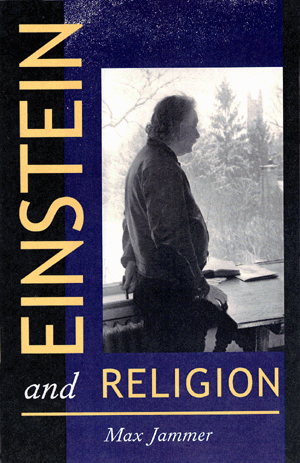Book Notes
 Max Jammer, Einstein and Religion (Princeton: Princeton University Press, 1999, 2002), 279pp.
Max Jammer, Einstein and Religion (Princeton: Princeton University Press, 1999, 2002), 279pp.
By some accounts Albert Einstein (1879–1955) was the greatest theoretical physicist of the twentieth century, if not of all time. Max Jammer, Professor of Physics Emeritus and former Rector at Bar-Ilan University in Israel, has written an eminently readable account of Einstein's thoughts on religion, a subject that he insists has been ignored by the over 400 books on Einstein published in the last several decades. Einstein renounced accusations that he was an atheist, and railed against the intolerance of those whom he called "the fanatical atheists." In his three long chapters Jammer portrays Einstein as "undogmatic and yet profoundly religious."
In his first chapter Jammer treats the role of religion in Einstein's private life. Born to what he described as "entirely irreligious Jewish parents," Einstein attended a Catholic primary school where like all students he received religious instruction. From the influences of nature and music he developed pronounced religious feelings quite early, although by age twelve he became estranged from institutional religion (although not from religion as he would define it) through reading some popular scientific books. His first wife, Mileva Maric, was Greek Orthodox, and his last wishes were to be cremated rather than to be buried in any religious tradition. Einstein was decidedly irreligious in the sense that he rejected any and all institutional affiliations, never attended worship services or prayed, rejected all dogmatic theology (eg, miracles, the afterlife or prayer), did not believe that God was in any sense personal, and was a strict determinist. But he found it impossible not to think of himself as religious in the sense of humility and awe at the mystery, rationality and complexity of nature: "the eternal mystery of the world is its comprehensibility." Behind the mystery of nature there seemed to be some superior intelligence: "I believe in Spinoza's God who reveals himself in the orderly harmony of what exists, not in a God who concerns himself with the fates and actions of human beings."
Chapter two explores what Einstein wrote about religion (he studiously avoided using the word "theology"). As a convinced determinist Einstein did not believe in human free will. He viewed science and religion as complementary rather than as antagonistic, seen in his famous aphorism that "science without religion is lame, religion without science is blind." Science cannot determine ethics or inform us of ultimate purpose or meaning, thought Einstein, for "knowledge of what is does not open the door directly to what should be." Science could never, then, displace or supercede religion. In his final and longest chapter, Jammer examines the possible ramifications of Einstein's theory of relativity and rejection of quantum mechanics ("God," wrote Einstein in 1926, "does not play dice.") for theological ideas like time, eternity, creation ex nihilo, and the Big Bang. Einstein himself rather disingenuously denied that there was any relationship between his physics and theology.
Well-known for his aversion to social convention and defiance of authority, Einstein used a paradox to summarize his personal beliefs and professional thoughts about religion. About a year before he died Einstein wrote in a letter that he understood himself to be a "deeply religious unbeliever." He rejected any and all notions of traditional, institutional religion, but he just as vociferously repudiated atheists who tried to claim him for their cause. Rather, he embraced something like grateful and humble Cosmic Awe at the beauty and complexity of the world he strove so mightily to understand.


